He’d heard rumours about the boatyards of the Azores and Hawaii. Some said that retirees who’d spent their working life dreaming of sailing away would sit at th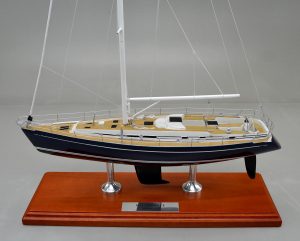 eir desks gazing a wooden yacht until the fantasy became a certainty and their bank account was emptied into a hole.
eir desks gazing a wooden yacht until the fantasy became a certainty and their bank account was emptied into a hole.
Then, these would-be sailors would set out, usually from the western or eastern coast of the United States. They would gladly set to sea, waving to their friends 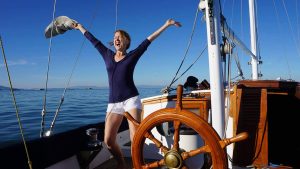 come to see them off from where the boat had sat in dock, and they would sail into the beautiful weather of their imagination.
come to see them off from where the boat had sat in dock, and they would sail into the beautiful weather of their imagination.
Once at sea, the drudgery would set in, but they would courageously turn their soft hands to the task of coiling rope and drawing sail. They would crow about their accomplishments online. They’d been correct all along, they were meant to be a sailor and they’d been trapped at an office job while they accumulated enough money to make the dream into reality.
The slap in the face 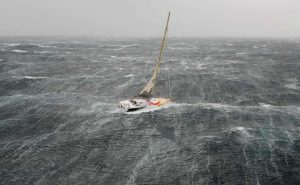 would come suddenly, just like a mugger will approach in the street. A squall, or perhaps a local storm which wasn’t reported by their weather service, would rock the boat of their fantasy until they began to get the queasy feeling that they’d been wrong.
would come suddenly, just like a mugger will approach in the street. A squall, or perhaps a local storm which wasn’t reported by their weather service, would rock the boat of their fantasy until they began to get the queasy feeling that they’d been wrong.
The seasickness would foreshadow what was to come, and they would realize how vast was the featureless desert that was the ocean. Waves would rear impossibly high, and they wouldn’t have the confidence of the true sailor that their boat would bob to the top like a cork. They would dread each wave’s approach, and cringe slightly even as their quavering voice fought to overpower the background howl of the 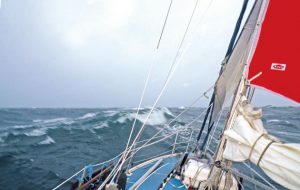 wind in the rigging.
wind in the rigging.
When the storm passed it would leave in its wake a torn sail and a lost line, but the greater impact would be on the mind of the soft-handed sailor. They would suddenly realize how cast on their own they were. If they were to call in desperation because they’d struck a lost shipping container in the night and sunk, days might pass before anyone came. Uneasy, even as they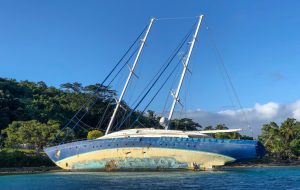 negotiated the deck, they would repeat aloud the sailor’s mantra, One hand for you, one for the boat, and when caught at it, they would grin sheepishly.
negotiated the deck, they would repeat aloud the sailor’s mantra, One hand for you, one for the boat, and when caught at it, they would grin sheepishly.
They would fancy, especially in their postings online, that they were more than prepared for a larger storm, but that confidence would be shaken from its perch 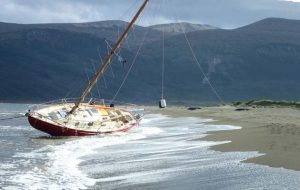 when a squall turned into a gale. Storms are common enough on land, where unshakable houses provide a place to hide, but at sea, where the house pitches up and down the standing rigging whines and creaks in the wind, they are terrifying. The storm warnings from the weather service would fall on deaf ears, for they would already be so frantic that nothing could be said that would assure them of their life’s continuity.
when a squall turned into a gale. Storms are common enough on land, where unshakable houses provide a place to hide, but at sea, where the house pitches up and down the standing rigging whines and creaks in the wind, they are terrifying. The storm warnings from the weather service would fall on deaf ears, for they would already be so frantic that nothing could be said that would assure them of their life’s continuity.
When the squall blew into a full-force gale, or the gale swept upon them without their realization 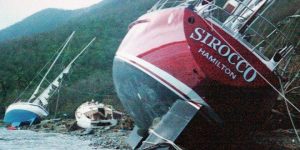 of what it might mean, they would spend their time shaking with nervous energy, shuddering with each pitch of the boat, and tugging fruitlessly at the storm sail they ran to keep the boat pointed into the wind. They would rethink every portion of their fantasy, curse the optimism and confidence that had set them to go to sea in a leaky vessel not worthy of its name.
of what it might mean, they would spend their time shaking with nervous energy, shuddering with each pitch of the boat, and tugging fruitlessly at the storm sail they ran to keep the boat pointed into the wind. They would rethink every portion of their fantasy, curse the optimism and confidence that had set them to go to sea in a leaky vessel not worthy of its name.
Their fear would coil lines around their feet, thrash their shoulders into bulkheads, and bruise their knuckles on stubborn blocks which refused to turn once the wind was on them. They would rail at the heavens, 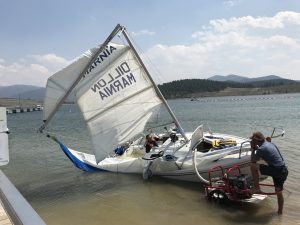 curse their gods and demons, but most of all they’d realize that the deadly mistake was their own, and they promised that if they could safely make landfall, they would never set sail again.
curse their gods and demons, but most of all they’d realize that the deadly mistake was their own, and they promised that if they could safely make landfall, they would never set sail again.
The nearest major ports for those who set out to cross the Atlantic or Pacific in their round-the-world tour would be the Azores on the Atlantic and the Hawaii archipelago in the Pacific. 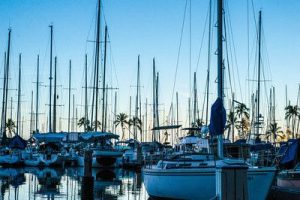 Their huge boatyards were crowded with boats that were all but abandoned. Maintained only by their dock fees, they were vessels in name only, for their owners had crept into dock shattered in spirit and by times in body. They would tie up, make some promises of when they’d return, and then take a room in a hotel.
Their huge boatyards were crowded with boats that were all but abandoned. Maintained only by their dock fees, they were vessels in name only, for their owners had crept into dock shattered in spirit and by times in body. They would tie up, make some promises of when they’d return, and then take a room in a hotel.
The soft wide beds, the Jacuzzi after a night of drinking, the company in the bar, would remind more of landfall than of a voyage’s end. Without looking in on the boat again, except to carry away a few precious items, the round-the-world sailors would board a flight for home. “There’s untended business I’ve left behind, and family trouble back on dry land,” they would plead, and the dock owners would let them go, the wad of cash for fees pulled from weak fingers proof that they still cared about the boat.
Such boats could often be bought for little more than the outstanding fees, but such a  venture is a real commitment to the project, however. The hundreds of abandoned boats showed that others had nursed a similar dream and that it had come to a slow drip of oil and water in a boatyard redolent with the smell of tarp and desperation. Only the most foolhardy of sailors would set out from a graveyard, and only someone whose weather eye was turned to the future would dare to take on the ill-fated slip-holders which were plastic boats abandoned by bankers and social workers, by teachers and software engineers.
venture is a real commitment to the project, however. The hundreds of abandoned boats showed that others had nursed a similar dream and that it had come to a slow drip of oil and water in a boatyard redolent with the smell of tarp and desperation. Only the most foolhardy of sailors would set out from a graveyard, and only someone whose weather eye was turned to the future would dare to take on the ill-fated slip-holders which were plastic boats abandoned by bankers and social workers, by teachers and software engineers.
